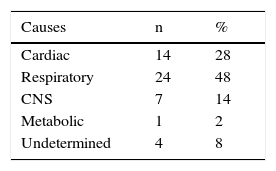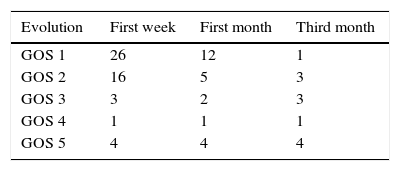Predictors of unfavourable outcome in patients after cardiopulmonary arrest (CPA) are important to make decisions about the limitation of therapeutic efforts. The aim was to analyse the clinical variables in the prognosis of patients recovered after CPA.
Material and methodRetrospective study on comatose patients with recovered CPA. The variables were: age, sex, Glasgow Coma Score (GCS), pupillary light reflex, other variables related to CPA (cause, duration, witnessed or not witnessed), myoclonic status and electroencephalographic (EEG) patterns.
ResultsFifty patients were studied. The variables associated with mortality were the absence of pupillary light reflex (hazard ratio [HR] 0.277, 95% confidence interval [95% CI] 0.103–0.741, P=.01), a low GCS (HR 0.701, 95% CI 0.542–0.908, P=.007) and myoclonic state (HR 0.38, 95% CI 0.176–0.854, P=.01). We evaluated the EEG patterns in 22 patients. No statistical significance was observed.
ConclusionsThe absence of pupillary light reflex, a low GCS and myoclonic state are prognostic factors in patients recovered after a CPA. The EEG patterns showed a nonsignificant association with prognosis.
La valoración de los enfermos tras un paro cardiorrespiratorio (PCR) es importante para la toma de decisiones sobre la limitación del esfuerzo terapéutico. El estudio buscó factores pronósticos en los pacientes tras un PCR recuperado.
Material y métodoEstudio retrospectivo de enfermos en coma tras un PCR. Se analizaron la edad, el sexo, el Glasgow Score Coma (GCS), los reflejos pupilares, las variables relacionadas con el PCR (causa, duración, presenciado o no presenciado), el estatus mioclónico y los patrones del electroencefalograma (EEG): mal pronóstico, pronóstico incierto y benigno.
ResultadosSe estudiaron 50 enfermos. Las variables asociadas con mortalidad fueron la ausencia de reflejos pupilares (riesgo relativo [RR] 0,277, intervalo de confianza del 95% [IC 95%] 0,103-0,741, p=0,01), el GCS bajo (RR 0,701, IC 95% 0,542-0,908, p=0,007) y el estatus mioclónico (RR 0,38, IC 95% 0,176-0,854, p=0,01). En 22 pacientes se analizaron los patrones del EEG, sin apreciarse significación estadística.
ConclusionesLa ausencia de reflejos pupilares, la baja puntuación del GCS y el estatus mioclónico son factores de mal pronóstico en pacientes tras un PCR. Los patrones del EEG mostraron una tendencia no significativa de asociación con el pronóstico.











